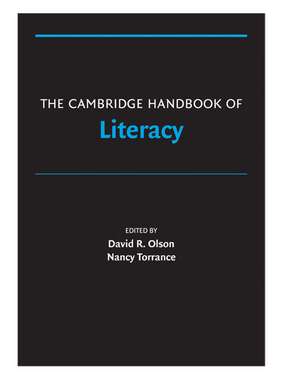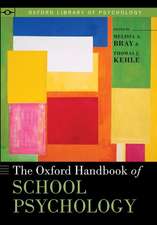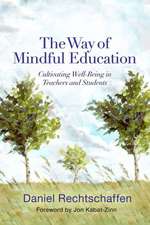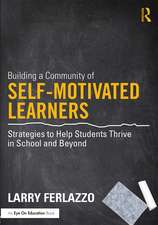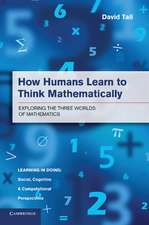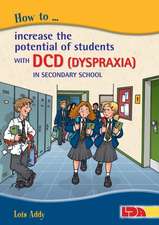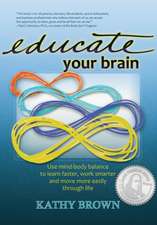The Cambridge Handbook of Literacy: Cambridge Handbooks in Psychology
Editat de David R. Olson, Nancy Torranceen Limba Engleză Paperback – 8 feb 2009
| Toate formatele și edițiile | Preț | Express |
|---|---|---|
| Paperback (1) | 483.18 lei 6-8 săpt. | |
| Cambridge University Press – 8 feb 2009 | 483.18 lei 6-8 săpt. | |
| Hardback (1) | 1074.85 lei 6-8 săpt. | |
| Cambridge University Press – 15 feb 2009 | 1074.85 lei 6-8 săpt. |
Din seria Cambridge Handbooks in Psychology
- 23%
 Preț: 1254.71 lei
Preț: 1254.71 lei - 11%
 Preț: 449.49 lei
Preț: 449.49 lei -
 Preț: 502.52 lei
Preț: 502.52 lei -
 Preț: 501.96 lei
Preț: 501.96 lei - 8%
 Preț: 426.60 lei
Preț: 426.60 lei -
 Preț: 486.56 lei
Preț: 486.56 lei - 5%
 Preț: 441.42 lei
Preț: 441.42 lei - 9%
 Preț: 1282.42 lei
Preț: 1282.42 lei -
 Preț: 494.25 lei
Preț: 494.25 lei - 8%
 Preț: 429.69 lei
Preț: 429.69 lei - 5%
 Preț: 397.85 lei
Preț: 397.85 lei - 23%
 Preț: 1246.12 lei
Preț: 1246.12 lei - 5%
 Preț: 439.60 lei
Preț: 439.60 lei - 19%
 Preț: 496.97 lei
Preț: 496.97 lei - 5%
 Preț: 718.47 lei
Preț: 718.47 lei -
 Preț: 511.59 lei
Preț: 511.59 lei - 8%
 Preț: 426.60 lei
Preț: 426.60 lei - 8%
 Preț: 427.05 lei
Preț: 427.05 lei - 8%
 Preț: 425.42 lei
Preț: 425.42 lei -
 Preț: 411.90 lei
Preț: 411.90 lei -
 Preț: 272.34 lei
Preț: 272.34 lei - 8%
 Preț: 425.42 lei
Preț: 425.42 lei - 9%
 Preț: 594.27 lei
Preț: 594.27 lei -
 Preț: 511.21 lei
Preț: 511.21 lei - 23%
 Preț: 1248.79 lei
Preț: 1248.79 lei -
 Preț: 370.88 lei
Preț: 370.88 lei - 8%
 Preț: 424.41 lei
Preț: 424.41 lei -
 Preț: 374.90 lei
Preț: 374.90 lei - 8%
 Preț: 427.49 lei
Preț: 427.49 lei -
 Preț: 511.59 lei
Preț: 511.59 lei - 5%
 Preț: 1538.86 lei
Preț: 1538.86 lei - 23%
 Preț: 2195.06 lei
Preț: 2195.06 lei - 8%
 Preț: 489.88 lei
Preț: 489.88 lei - 8%
 Preț: 428.36 lei
Preț: 428.36 lei -
 Preț: 488.47 lei
Preț: 488.47 lei - 9%
 Preț: 850.10 lei
Preț: 850.10 lei - 8%
 Preț: 430.05 lei
Preț: 430.05 lei -
 Preț: 497.35 lei
Preț: 497.35 lei -
 Preț: 283.03 lei
Preț: 283.03 lei
Preț: 483.18 lei
Nou
Puncte Express: 725
Preț estimativ în valută:
92.47€ • 96.42$ • 76.85£
92.47€ • 96.42$ • 76.85£
Carte tipărită la comandă
Livrare economică 20 martie-03 aprilie
Preluare comenzi: 021 569.72.76
Specificații
ISBN-13: 9780521680523
ISBN-10: 0521680522
Pagini: 624
Ilustrații: 33 b/w illus. 5 colour illus. 11 tables
Dimensiuni: 175 x 251 x 28 mm
Greutate: 1.07 kg
Editura: Cambridge University Press
Colecția Cambridge University Press
Seria Cambridge Handbooks in Psychology
Locul publicării:New York, United States
ISBN-10: 0521680522
Pagini: 624
Ilustrații: 33 b/w illus. 5 colour illus. 11 tables
Dimensiuni: 175 x 251 x 28 mm
Greutate: 1.07 kg
Editura: Cambridge University Press
Colecția Cambridge University Press
Seria Cambridge Handbooks in Psychology
Locul publicării:New York, United States
Cuprins
Part I. Literacy as a Scientific Subject: 1. The literacy episteme (from Innis to Derrida) Jens Brockmeier and David Olson; Part II. Literacy and Language: 2. Grammotology Peter T. Daniels; 3. Speech and writing Roy Harris; 4. The origins and co-evolution of literacy and numeracy Steven Chrisomalis; 5. Are there linguistic consequences of literacy? Comparing the potentials of language use in speech and writing Douglas Biber; 6. Becoming a literate language user: oral and written text construction across adolescence Ruth A. Berman and Dorit Ravid; 7. The challenge of academic language Catherine Snow and Paola Uccelli; 8. The basic processes in reading: insights from neuroscience Usha Goswami; 9. Language and literacy from a cognitive neuroscience perspective Karl Magnus Petersson, Martin Ingvaar, and Alexandra Reis; Part III. Literacy and Literatures: 10. Ways of reading Elizabeth Long; 11. Conventions of reading Heather Murray; 12. Literacy, reading and concepts of the self Carolyn Steedman; 13. Reading as a woman, being read as a woman Lisbeth Larsson; 14. Literacy and the history of science Karine Chemla; 15. Scientific literacy Steven Norris and Linda Phillips; 16. Digital literacy Teresa Dobson and John Willinsky; 17. Literacy, video games and popular culture James Paul Gee; Part IV. Literacy and Society: 18. Ethnography of writing and reading Brian Street; 19. The origins of Western literacy: literacy in Ancient Greece and Rome Rosalind Thomas; 20. Literacy from late antiquity to the early Middle Ages, c. 300–800 Nicholas Everett; 21. Chinese literacy Feng Wang, Yaching Tsai and William Shi-Yuan Wang; 22. The elephant in the room: language and literacy in the Arab world Niloofar Haeri; 23. Literacy, modernization, the intellectual community and civil society in the western world Frits van Holthoon; Part V. Literacy and Education: 24. The teaching of literacy skills in Western Europe: an historical perspective (16th to 20th centuries) A.-M. Chartier; 25. The configuration of literacy as a domain of knowledge Liliana Tolchinsky; 26. Literate thinking: metalinguistics and metacognition Bruce Homer; 27. Cultural and developmental predispositions to literacy Alison Garton and Chris Pratt; 28. Literacy and international development: education and literacy as human rights Joe Farrell; 29. Adult literacy education in industrialized nations Tom Sticht; 30. New technologies for literacy and international development Daniel Wagner; 31. Literacy theory and literacy policy David Olson.
Recenzii
“The Cambridge Handbook of Literacy offers a broad descriptive perspective not driven by an immediate educational agenda. When schooling’s relation to literacy is approached within this cross-cultural, non-curricular frame, we come to see the dilemmas and processes of schooling in new ways. The fresh approach of this volume introduces many topics not covered in other reference volumes and expands our view of the multidimensional complexity of literacy. Many chapters also develop a fully participatory view of literacy that puts writing on an even and interactive footing with reading. The international, interdisciplinary authors cover wide-ranging topics from the cognitive skills necessary to read Chinese mathematics to the tensions between classical and vernacular Arabic, from neuroscience to cultural authority, from grammatology to international development. This volume is a welcome addition to our growing knowledge of reading, writing, and texts within human life.”
—Charles Bazerman, University of California, Santa Barbara
“A new compendium on a venerable topic, with unprecedented comprehensiveness and depth. This is an essential reference for scholars interested in the origins, impact, and dissemination of literacy, in its widest definition.”
—Merlin Donald, Professor Emeritus, Queen’s University
“David Olson and Nancy Torrance are acknowledged authorities in literacy studies and this volume brings together their skills as both thinkers and editors. The essays provide a comprehensive introduction to the historical, anthropological, and psychological dimensions of literacy.”
—Brian Stock, Emeritus Professor of History and Literature, University of Toronto
"The Cambridge Handbook of Literacy stands alone as an interdisciplinary inquiry and an informed addition to the study of literacy. The handbook will probably be embraced by a diverse audience in addition to the community of researchers in the disciplines represented. I recommend that this significant contribution to the existing resources on the nature and study of literacy be used by university professors of literacy as a text for graduate courses in language and literacy. Undergraduates pursuing advanced studies in literacy should also read it. Parts of it could be used in professional learning communities for teacher researchers who are keen and enthusiastic about the study of literacy and wish to challenge their thinking and enliven their dialogue about the nature and changing role of literacy. Beyond this, several chapters of the handbook may benefit senior government officials responsible for developing international literacy standards and policies. After reading The Cambridge Handbook of Literacy, one cannot help but ask the question, How can literacy not be important to everyone?"
—Vera Janjic-Watrich, University of Alberta
"The Cambridge Handbook of Literacy, edited by David Olson and Nancy Torrance from University of Toronto, joins a hefty list of Cambridge Handbooks on various topics related to psychology, language and learning. This handbook sets out to examine literacy in its widest sense; to examine both the visual signs for linguistic forms, and the social and personal uses of these signs, from mundane to the literary, both historically and currently. It aims to address a gap that it identifies in the literature: the lack of an authoritative text on literacy as a field in itself, and in providing such a text, further aims to provide scope for future interdisciplinary work...."
--Rauno Parrila, University of Alberta and Nenagh Kemp, University of Tasmania, Australia, Canadian Psychology/Psychologie Canadienne
—Charles Bazerman, University of California, Santa Barbara
“A new compendium on a venerable topic, with unprecedented comprehensiveness and depth. This is an essential reference for scholars interested in the origins, impact, and dissemination of literacy, in its widest definition.”
—Merlin Donald, Professor Emeritus, Queen’s University
“David Olson and Nancy Torrance are acknowledged authorities in literacy studies and this volume brings together their skills as both thinkers and editors. The essays provide a comprehensive introduction to the historical, anthropological, and psychological dimensions of literacy.”
—Brian Stock, Emeritus Professor of History and Literature, University of Toronto
"The Cambridge Handbook of Literacy stands alone as an interdisciplinary inquiry and an informed addition to the study of literacy. The handbook will probably be embraced by a diverse audience in addition to the community of researchers in the disciplines represented. I recommend that this significant contribution to the existing resources on the nature and study of literacy be used by university professors of literacy as a text for graduate courses in language and literacy. Undergraduates pursuing advanced studies in literacy should also read it. Parts of it could be used in professional learning communities for teacher researchers who are keen and enthusiastic about the study of literacy and wish to challenge their thinking and enliven their dialogue about the nature and changing role of literacy. Beyond this, several chapters of the handbook may benefit senior government officials responsible for developing international literacy standards and policies. After reading The Cambridge Handbook of Literacy, one cannot help but ask the question, How can literacy not be important to everyone?"
—Vera Janjic-Watrich, University of Alberta
"The Cambridge Handbook of Literacy, edited by David Olson and Nancy Torrance from University of Toronto, joins a hefty list of Cambridge Handbooks on various topics related to psychology, language and learning. This handbook sets out to examine literacy in its widest sense; to examine both the visual signs for linguistic forms, and the social and personal uses of these signs, from mundane to the literary, both historically and currently. It aims to address a gap that it identifies in the literature: the lack of an authoritative text on literacy as a field in itself, and in providing such a text, further aims to provide scope for future interdisciplinary work...."
--Rauno Parrila, University of Alberta and Nenagh Kemp, University of Tasmania, Australia, Canadian Psychology/Psychologie Canadienne
Descriere
Everything that is involved in being and becoming literate is the concern of this interdisciplinary group of distinguished scholars.
